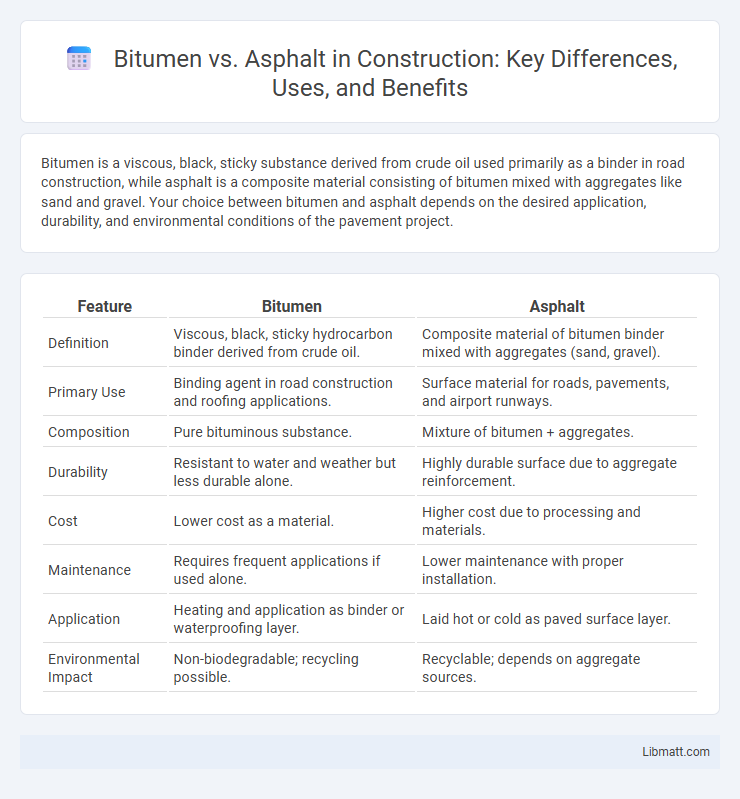Bitumen is a viscous, black, sticky substance derived from crude oil used primarily as a binder in road construction, while asphalt is a composite material consisting of bitumen mixed with aggregates like sand and gravel. Your choice between bitumen and asphalt depends on the desired application, durability, and environmental conditions of the pavement project.
Table of Comparison
| Feature | Bitumen | Asphalt |
|---|---|---|
| Definition | Viscous, black, sticky hydrocarbon binder derived from crude oil. | Composite material of bitumen binder mixed with aggregates (sand, gravel). |
| Primary Use | Binding agent in road construction and roofing applications. | Surface material for roads, pavements, and airport runways. |
| Composition | Pure bituminous substance. | Mixture of bitumen + aggregates. |
| Durability | Resistant to water and weather but less durable alone. | Highly durable surface due to aggregate reinforcement. |
| Cost | Lower cost as a material. | Higher cost due to processing and materials. |
| Maintenance | Requires frequent applications if used alone. | Lower maintenance with proper installation. |
| Application | Heating and application as binder or waterproofing layer. | Laid hot or cold as paved surface layer. |
| Environmental Impact | Non-biodegradable; recycling possible. | Recyclable; depends on aggregate sources. |
Bitumen vs Asphalt: Key Differences Explained
Bitumen is a sticky, black, viscous substance derived from crude oil refining, primarily used as a binder in road construction. Asphalt is a composite material consisting of bitumen mixed with aggregates such as sand, gravel, or crushed stone, forming the solid surface layer of roads. The key difference lies in bitumen being the binder, while asphalt refers to the finished paving material used in highway and road surfacing projects.
What is Bitumen? Composition and Uses
Bitumen is a viscous, black, sticky substance derived from crude oil refining, primarily composed of complex hydrocarbons including asphaltenes, resins, and oils. It serves as a binder in road construction, coating aggregates to form durable asphalt mixtures, and is also used for waterproofing in roofing and sealing applications. Its adhesive and waterproofing properties make bitumen essential in civil engineering and infrastructure projects.
Understanding Asphalt: Components and Applications
Asphalt is a composite material consisting of bitumen as the binder and aggregates such as sand, gravel, or crushed stone, offering durability and flexibility for road construction. Bitumen acts as a viscous adhesive that binds the aggregates together, providing waterproofing and resistance to wear and deformation. Common applications of asphalt include paving highways, airport runways, and parking lots, where its ability to withstand heavy traffic and environmental conditions is essential.
Production Processes: Bitumen and Asphalt Compared
Bitumen is produced through the distillation of crude oil, where heavy fractions are thermally cracked to obtain a viscous, black binder used in road construction. Asphalt combines bitumen with mineral aggregates like sand, gravel, or crushed stone, creating a composite material optimized for paving surfaces. Your choice depends on needing the pure adhesive properties of bitumen or the durable, load-bearing characteristics of asphalt mixtures.
Performance Characteristics: Durability and Flexibility
Bitumen offers excellent waterproofing and adhesive properties, making it highly durable for various construction applications, while asphalt combines bitumen with aggregates to enhance flexibility and load-bearing capacity on roads. Asphalt's flexible nature allows it to better withstand temperature variations and heavy traffic without cracking, whereas bitumen alone can become brittle under extreme cold. To ensure the longevity and performance of your pavement, selecting the appropriate material based on environmental conditions and usage requirements is crucial.
Environmental Impact: Bitumen vs Asphalt
Bitumen, a petroleum-derived binder, releases significant greenhouse gases during production and contributes to environmental pollution through volatile organic compounds (VOCs). Asphalt, composed of bitumen mixed with aggregates, can be recycled extensively, reducing landfill waste and resource consumption, which lowers its environmental footprint compared to pure bitumen. The manufacturing and application processes of asphalt typically generate fewer emissions, making it a more sustainable choice in road construction and maintenance.
Cost Comparison: Bitumen and Asphalt Projects
Bitumen typically incurs lower upfront costs than asphalt due to its simpler production process and raw material availability, making it more economical for large-scale projects. Asphalt, composed of bitumen mixed with aggregates, often demands higher installation expenses due to more complex engineering and precision layering. Long-term maintenance costs for bitumen may increase because of susceptibility to weathering, whereas asphalt can provide better durability and lifecycle value despite the initial investment.
Common Applications in Construction
Bitumen is commonly used as a binder in road construction, roofing, and waterproofing applications due to its adhesive and waterproofing properties. Asphalt, a mixture of bitumen and aggregates, is primarily utilized for paving roads, highways, airport runways, and parking lots, offering durability and load-bearing capacity. Both materials play critical roles in infrastructure development, with bitumen emphasizing waterproofing and asphalt focusing on structural surface construction.
Maintenance and Lifespan Differences
Bitumen requires less frequent maintenance due to its naturally water-resistant properties, while asphalt demands regular sealing and patching to prevent cracking and potholes. The lifespan of bitumen surfaces can extend up to 15-20 years with minimal upkeep, whereas asphalt typically lasts 10-15 years depending on climate and traffic conditions. You can maximize the durability of both materials by adhering to proper maintenance schedules tailored for each type.
Choosing Between Bitumen and Asphalt: Factors to Consider
Choosing between bitumen and asphalt depends on factors such as project duration, climate conditions, and application requirements. Bitumen, a sticky, black, viscous liquid, offers superior waterproofing and adhesive properties ideal for roofing and sealing, while asphalt, a mixture of aggregates and bitumen, provides durability and flexibility suitable for road construction. Evaluating cost-effectiveness, maintenance needs, and environmental impact guides the selection process for optimal performance.
Bitumen vs asphalt Infographic

 libmatt.com
libmatt.com